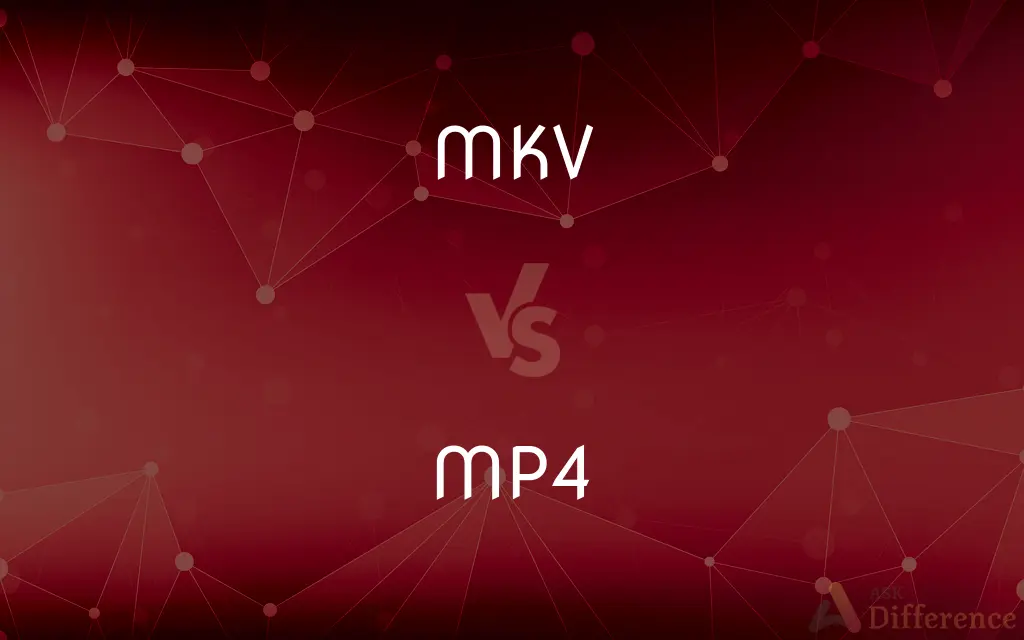MKV vs. MP4 — What's the Difference?
By Tayyaba Rehman — Published on January 8, 2024
MKV (Matroska Video) is a container format supporting multiple audio, video, and subtitle streams, while MP4 is a widely-used container format with broad device compatibility.

Difference Between MKV and MP4
Table of Contents
ADVERTISEMENT
Key Differences
MKV, standing for Matroska Video, is an open-standard container format. It's designed to encompass multiple streams, such as audio, video, and subtitles within a single file. In contrast, MP4 is a digital multimedia container format, a descendant of the QuickTime format, and is widely accepted on numerous platforms and devices.
The versatility of MKV is a standout feature. MKV files can contain an array of video and audio codecs, multiple subtitle tracks, and even chapter information. MP4, on the other hand, has certain limitations on the codecs it supports but boasts compatibility and is one of the most recognized formats for streaming and playback on many devices.
In the realm of software support, MKV might not be as widely recognized as MP4. Some media players or devices may not natively support MKV without additional codecs or software. Meanwhile, MP4's ubiquity ensures that almost all devices and media players, from smartphones to gaming consoles, can play it without a hitch.
MKV is often the go-to choice for high-definition video content or when users want to embed multiple subtitle or audio tracks. MP4, with its broad acceptance and compatibility, is favored for online streaming, video sharing, and mobile device playback.
The choice between MKV and MP4 often boils down to specific needs. If extensive customization and multiple embedded streams are essential, MKV shines. If broad compatibility and device support are the priority, MP4 is hard to beat.
ADVERTISEMENT
Comparison Chart
Full Form
Matroska Video
MPEG-4 Part 14
Supported Codecs
Multiple audio, video, and subtitle codecs.
Limited audio and video codecs.
Compatibility
Not as widely supported on devices without additional tools.
Broadly compatible across devices and platforms.
Main Use
High-definition content, multiple audio/subtitle tracks.
Streaming, broad playback, mobile devices.
Origin
Open standard.
Descendant of QuickTime format.
Compare with Definitions
MKV
Not always natively supported on devices.
I had to download a special player to view the MKV file on my phone.
MP4
Favored for online streaming and sharing.
The majority of online streaming sites utilize MP4 for its reliability.
MKV
Ideal for high-definition content storage.
For my HD movie collection, I usually opt for MKV.
MP4
Descendant of the QuickTime format.
MP4 evolved from Apple's QuickTime, which explains its broad compatibility.
MKV
Supports a variety of audio, video, and subtitle codecs.
I prefer MKV for its ability to handle different codecs seamlessly.
MP4
Limited in supported codecs compared to some formats.
While MP4 is versatile, it doesn't support as many codecs as MKV.
MKV
An open-standard multimedia container format.
The movie was saved in an MKV format with multiple subtitle options.
MP4
A popular multimedia container format.
Most of the videos on my phone are in MP4 format.
MKV
Can contain multiple tracks and chapter info.
The MKV file had three different audio tracks to choose from.
MP4
Widely accepted across many platforms and devices.
I never worry about compatibility when sharing an MP4 video.
Common Curiosities
Can MKV files have multiple subtitle tracks?
Yes, MKV can contain multiple audio, video, and subtitle tracks.
What does MKV stand for?
MKV stands for Matroska Video.
What is the primary use of MP4?
MP4 is mainly used for online streaming, video sharing, and broad playback on devices.
Is MP4 more widely compatible than MKV?
Yes, MP4 is generally more compatible across devices and platforms than MKV.
From which format did MP4 evolve?
MP4 is a descendant of the QuickTime format.
Why might someone choose MKV over MP4?
Someone might choose MKV for its ability to support multiple codecs and embed multiple tracks.
Is there a quality difference between MKV and MP4?
The container itself doesn't determine quality, but the codecs and compression used do. Both MKV and MP4 can have high-quality content.
Are all online videos in MP4 format?
Not all, but MP4 is a predominant format due to its compatibility and streaming capabilities.
Do I need a special player for MKV files?
Some devices might require additional software or codecs to play MKV files.
Are MKV files typically larger than MP4?
Not necessarily. File size is more about the codecs used and compression rate than the container format.
Do all media players support MP4?
Most modern media players support MP4 due to its widespread use and acceptance.
Can I edit videos in MKV or MP4 format?
Yes, many video editing software tools can edit both MKV and MP4 files, though compatibility might vary.
Can I convert MKV to MP4?
Yes, many software tools allow for the conversion between MKV and MP4.
Which is older, MKV or MP4?
MP4, as a descendant of the QuickTime format, predates MKV.
Why do some professionals prefer MKV?
Professionals might prefer MKV for its flexibility, support for various codecs, and ability to embed multiple streams.
Share Your Discovery

Previous Comparison
Standard Cost vs. Actual Cost
Next Comparison
Brake Fluid vs. Power Steering FluidAuthor Spotlight
Written by
Tayyaba RehmanTayyaba Rehman is a distinguished writer, currently serving as a primary contributor to askdifference.com. As a researcher in semantics and etymology, Tayyaba's passion for the complexity of languages and their distinctions has found a perfect home on the platform. Tayyaba delves into the intricacies of language, distinguishing between commonly confused words and phrases, thereby providing clarity for readers worldwide.












































